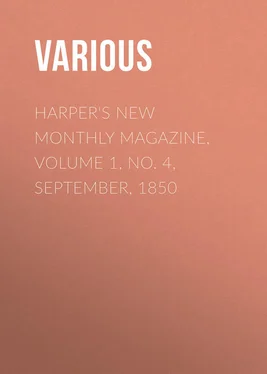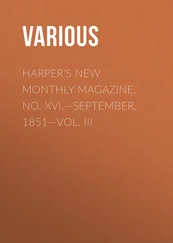Various - Harper's New Monthly Magazine, Volume 1, No. 4, September, 1850
Здесь есть возможность читать онлайн «Various - Harper's New Monthly Magazine, Volume 1, No. 4, September, 1850» — ознакомительный отрывок электронной книги совершенно бесплатно, а после прочтения отрывка купить полную версию. В некоторых случаях можно слушать аудио, скачать через торрент в формате fb2 и присутствует краткое содержание. Издательство: Иностранный паблик, Жанр: periodic, foreign_edu, на английском языке. Описание произведения, (предисловие) а так же отзывы посетителей доступны на портале библиотеки ЛибКат.
- Название:Harper's New Monthly Magazine, Volume 1, No. 4, September, 1850
- Автор:
- Издательство:Иностранный паблик
- Жанр:
- Год:неизвестен
- ISBN:нет данных
- Рейтинг книги:5 / 5. Голосов: 1
-
Избранное:Добавить в избранное
- Отзывы:
-
Ваша оценка:
- 100
- 1
- 2
- 3
- 4
- 5
Harper's New Monthly Magazine, Volume 1, No. 4, September, 1850: краткое содержание, описание и аннотация
Предлагаем к чтению аннотацию, описание, краткое содержание или предисловие (зависит от того, что написал сам автор книги «Harper's New Monthly Magazine, Volume 1, No. 4, September, 1850»). Если вы не нашли необходимую информацию о книге — напишите в комментариях, мы постараемся отыскать её.
Harper's New Monthly Magazine, Volume 1, No. 4, September, 1850 — читать онлайн ознакомительный отрывок
Ниже представлен текст книги, разбитый по страницам. Система сохранения места последней прочитанной страницы, позволяет с удобством читать онлайн бесплатно книгу «Harper's New Monthly Magazine, Volume 1, No. 4, September, 1850», без необходимости каждый раз заново искать на чём Вы остановились. Поставьте закладку, и сможете в любой момент перейти на страницу, на которой закончили чтение.
Интервал:
Закладка:
A FIVE DAYS’ TOUR IN THE ODENWALD
The Odenwald, or Forest of Odin, is one of the most primitive districts of Germany. It consists of a hilly, rather than a mountainous district, of some forty miles in one direction, and thirty in another. The beautiful Neckar bounds it on the south; on the west it is terminated by the sudden descent of its hills into the great Rhine plain. This boundary is well known by the name of the Bergstrasse, or mountain road; which road, however, was at the foot of the mountains, and not over them, as the name would seem to imply. To English travelers, the beauty of this Bergstrasse is familiar. The hills, continually broken into by openings into romantic valleys, slope rapidly down to the plain, covered with picturesque vineyards; and at their feet lie antique villages, and the richly-cultivated plains of the Rhine, here thirty or forty miles wide. On almost every steep and projecting hill, or precipitous cliff, stands a ruined castle, each, as throughout Germany, with its wild history, its wilder traditions, and local associations of a hundred kinds. The railroad from Frankfort to Heidelberg now runs along the Bergstrasse, and will ever present to the eyes of travelers the charming aspect of these old legendary hills; till the enchanting valley of the Neckar, with Heidelberg reposing amid its lovely scenery at its mouth, terminates the Bergstrasse, and the hills which stretch onward, on the way toward Carlsruhe, assume another name.
Every one ascending the Rhine from Mayence to Mannheim has been struck with the beauty of these Odenwald hills, and has stood watching that tall white tower on the summit of one of them, which, with windings of the river, seem now brought near, and then again thrown very far off; seemed to watch and haunt you, and, for many hours, to take short cuts to meet you, till, at length, like a giant disappointed of his prey, it glided away into the gray distance, and was lost in the clouds. This is the tower of Melibocus, above the village of Auerbach, to which we shall presently ascend, in order to take our first survey of this old and secluded haunt of Odin.
This quiet region of hidden valleys and deep forests extends from the borders of the Black Forest, which commences on the other side of the Neckar, to the Spessart, another old German forest; and in the other direction, from Heidelberg and Darmstadt, toward Heilbronn. It is full of ancient castles, and a world of legends. In it stands, besides the Melibocus, another tower, on a still loftier point, called the Katzenbuckel, which overlooks a vast extent of these forest hills. Near this lies Eberbach, a castle of the descendants of Charlemagne, which we shall visit; the scenes of the legend of the Wild Huntsman; the castles of Götz von Berlichingen, and many another spot familiar by its fame to our minds from childhood. But besides this, the inhabitants are a people living in a world of their own; retaining all the simplicity of their abodes and habits; and it is only in such a region that you now recognize the pictures of German life such as you find them in the Haus Märchen of the brothers Grimm.
In order to make ourselves somewhat acquainted with this interesting district, Mrs. Howitt and myself, with knapsack on back, set out at the end of August, 1841, to make a few days’ ramble on foot through it. The weather, however, proved so intensely hot, and the electrical sultriness of the woods so oppressive, that we only footed it one day, when we were compelled to make use of a carriage, much to our regret.
On the last day in August we drove with a party of friends, and our children, to Weinheim; rambled through its vineyards, ascended to its ancient castle, and then went on to Birkenau Thal, a charming valley, celebrated, as its name denotes, for its lovely hanging birches, under which, with much happy mirth, we dined.
Scrambling among the hills, and winding up the dry footpaths, among the vineyards of this neighborhood, we were yet more delighted with the general beauty of the scenery, and with the wild-flowers which every where adorned the hanging cliffs and warm waysides. The marjorum stood in ruddy and fragrant masses; harebells and campanulas of several kinds, that are cultivated in our gardens, with bells large and clear; crimson pinks; the Michaelmas daisy; a plant with a thin, radiated yellow flower, of the character of an aster; a centaurea of a light purple, handsomer than any English one; a thistle in the dryest places, resembling an eryngo, with a thick, bushy top; mulleins, yellow and white; the wild mignonnette, and the white convolvulus; and clematis festooning the bushes, recalled the flowery fields and lanes of England, and yet told us that we were not there. The meadows had also their moist emerald sward scattered with the grass of Parnassus, and an autumnal crocus of a particularly delicate lilac.
At the inn, at the mouth of Birkenau Thal, we proposed to take the eilwagen as far as Auerbach, but that not arriving, we availed ourselves of a peasant’s light wicker wagon. The owner was a merry fellow, and had a particularly spirited black horse; and taking leave of our friends, after a delightful day, we had a most charming drive to Auerbach, and one equally amusing, from the conversation of our driver.
After tea we ascended to Auerbach Castle, which occupies a hill above the town, still far overtopped, however, by the height of Melibocus. The view was glorious. The sunset across the great Rhine plain was magnificent. It diffused over the whole western sky an atmosphere of intense crimson light, with scattered golden clouds, and surrounded by a deep violet splendor. The extremities of the plain, from the eye being dazzled with this central effulgence, lay in a solemn and nearly impenetrable gloom. The castle in ruins, seen by this light, looked peculiarly beautiful and impressive. In the court on the wall was an inscription, purporting that a society in honor of the military career of the Grand Duke of Hesse-Darmstadt, in whose territory and in that of Baden the Odenwald chiefly lies, had here celebrated his birthday in the preceding July. Round the inscription hung oaken garlands, within each of which was written the name and date of the battles in which he had been engaged against the French. An altar of moss and stones stood at a few yards’ distance in front of these memorials, at which a peasant living in the tower told us, the field-preacher had delivered an oration on the occasion.
In the morning, at five o’clock, we began to ascend the neighboring heights of Melibocus. It took us an hour and a quarter. The guide carried my knapsack; and as we went, men came up through different footpaths in the woods, with hoes on their shoulders. When we arrived on the top, we found others, and among them some women, accompanied by a policeman. They were peasants who had been convicted of cutting wood for fuel in the hills, and were adjudged to pay a penalty, or in default, to work it out in hoeing and clearing the young plantations for a proportionate time – a much wiser way than shutting them up in a prison, where they are of no use either to themselves or the state.
The view from the tower, eighty feet in height, over the great Rhine plain, is immense and splendid, including two hundred villages, towns, and cities. The windings of the magnificent Rhine lie mapped out below you, and on its banks are seen, as objects of peculiar interest, the cathedral of Speier, the lofty dome of the Jesuits’ church at Mannheim, and the four towers of the noble cathedral of Worms. In the remote distance, as a fitting termination to this noble landscape, are seen the heights of the Donnersberg, the Vosges, and the Schwarzwald.
The policeman, who followed us up into the tower, mentioned the time when the inhabitants of that district had hastened thither to watch the approach of the French armies, and pointed out the spot where they were first seen, and described their approach, and the terrors and anxieties of the people, in the most lively and touching manner.
Читать дальшеИнтервал:
Закладка:
Похожие книги на «Harper's New Monthly Magazine, Volume 1, No. 4, September, 1850»
Представляем Вашему вниманию похожие книги на «Harper's New Monthly Magazine, Volume 1, No. 4, September, 1850» списком для выбора. Мы отобрали схожую по названию и смыслу литературу в надежде предоставить читателям больше вариантов отыскать новые, интересные, ещё непрочитанные произведения.
Обсуждение, отзывы о книге «Harper's New Monthly Magazine, Volume 1, No. 4, September, 1850» и просто собственные мнения читателей. Оставьте ваши комментарии, напишите, что Вы думаете о произведении, его смысле или главных героях. Укажите что конкретно понравилось, а что нет, и почему Вы так считаете.












